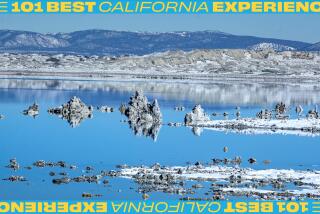The Pits No More : Yuba City Prunes Its Way Out of Cellar as a Place to Live
- Share via
YUBA CITY, Calif. — There is no ballet here and no symphony orchestra. There are no universities, major hospitals or museums. There is not even a hotel in town.
Because Yuba City is bereft of so many amenities, the map-making company Rand McNally rated it in 1985--its last report--as the worst place to live in the United States.
But while Yuba City has gained notoriety for all the things it doesn’t have, it has one thing that sets it apart from most other cities in the country: prunes.
So in the tense aftermath of Rand McNally’s rating, when civic leaders scrambled to improve the city’s image, they decided to highlight the town’s one distinguishing feature. They organized a prune festival.
“When the festival was first mentioned I was against it,” said Mayor Lawrence Mark, a retired butcher. “When people think of prunes they think of something you take to keep you regular. I asked: ‘Is that what Yuba City wants to be known for?’ But we do grow more prunes around here than any other area in the country, so why not be proud of it?”
Prune Festival Blossoms
The first annual prune festival, held last month, was the capstone of a three-year image-building campaign launched by civic leaders after being ranked 329th out of 329 communities rated by Rand McNally.
While other cities listed near the bottom were sullenly defensive, Yuba City--a farm community of about 23,000, 35 miles north of Sacramento--used the ranking as a catalyst to improve the city. And now, Mark said, the 329 ranking “was the best thing that ever happened to us.”
“At first we were mad as hell,” Mark said. “We thought, gee whiz, we have this nice little community here and all of a sudden these outsiders are telling us our town’s at the bottom of the barrel.
“But it opened our eyes to some of the ways we needed to improve our city. And it got people organized. It got people working together, for the first time, on a lot of things that needed to be done.”
The following was accomplished following the ranking:
- A “329 Committee” was formed to counteract the publicity of the rating. The committee raised $15,000 for advertisements in California business magazines, including one that was headlined: “What Rand McNally Didn’t Tell You About Business Opportunities in Yuba City.”
- The city named an economic development director to promote the area, lure businesses and help them obtain loans. The city also hired a public relations firm that created a slick brochure to bolster the city’s image.
- In the last two years, four businesses have moved to Yuba City, creating more than 80 jobs. A number of other businesses are discussing the possibility of moving to the area. And ground-breaking on the city’s first mall begins in November.
- Stung by the criticism about the dearth of culture and recreation in Yuba City, residents formed a theater company. And negotiations are under way to build an 18-hole golf course.
“Some of the things we’ve accomplished might have happened anyway . . . but who knows how long it would have taken?” said Jeffrey Foltz, Yuba City administrator. “The 329 thing pushed it. It lit the fuse to the cannon.”
When a section of Yuba City was named by the state as one of 10 “enterprise zones” in California, many local politicians gave the 329 rating much of the credit, said City Councilman William Meagher. The enterprise zone program is highly competitive because communities selected can attract businesses by offering a variety of tax incentives and loans.
Also as a result of the low rating, Yuba City officials visiting Sacramento were able to meet personally with Gov. George Deukmejian and have lunch with state Commerce Department officials, who selected the enterprise zones.
“Our plight of being ranked last enabled us to get the attention of some important people,” Meagher said. “I’m sure this helped us get named as an enterprise zone. . . . The governor was very supportive. He said he’d been to Yuba City and couldn’t understand how we got ranked last.”
But after a quick cruise around town, many visitors do understand the Rand McNally rating. Colusa Avenue--the main thoroughfare through Yuba City--is lined almost exclusively by fast-food restaurants, used-car lots, gas stations and chain stores. There are so many restaurants featuring fried food--including one advertising “Eat and Run . . . Chicken and Donuts”--that even those passing through at a brisk speed are assaulted by the smell of grease.
This is a main street that was designed in slavish obeisance to the automobile. Enormous parking lots abound on Colusa Avenue, but the visitor is hard-pressed to find a patch of grass, a tree or any other hint of vegetation.
City officials concede that urban planning has been a term rarely heard around Yuba City. But after the 329 rating, local politicians finally began controlling “schlock development,” as Councilman Meagher put it. An ordinance requiring developers to landscape significant sections of new projects was instituted, and the city is working with Caltrans to beautify a highway that cuts through town.
Pockets of Beauty
While much of Yuba City is a testament to fast-food operators run amok, the enterprising visitor can discover striking pockets of beauty. Thousands of acres of plum trees, heavy with violet fruit, frame the town. Long-necked snow geese soar over the fields of wild mustard that flank the banks of the Feather River. Beyond the almond and peach orchards on the edge of town, the Sutter Buttes, a miniature mountain range that rises dramatically out of the broad, flat Sacramento Valley, are silhouetted by a neon blue sky.
But the occasional glimpses of scenic beauty did not sway those who compiled Rand McNally’s “Places Rated Almanac.” Communities with a population of more than 100,000 were judged on the basis of availability of transportation, the arts, health care and education, among other factors. The counties of Yuba and Sutter were classified as a metropolitan area, and because Yuba City is the largest community in the rural counties, it was designated to represent the area.
Although civic leaders eventually accepted the rating with equanimity, initially they were outraged when the almanac found them wanting in almost every category. Hundreds of residents gathered at the county fairgrounds for a “Go Yuba City” rally. They wore buttons and carried signs with messages such as: “Up Your Atlas Rand McNally,” and “Kiss My Buttes.” Residents held a Rand McNally map burning, deposited the ashes in a big urn and delivered it to the firm’s offices in San Francisco.
So Mad He Sued
Jack Moncrief was so incensed he filed a $3.5-million damage suit against Rand McNally. He eventually dropped the suit because “I was portrayed as an opportunist taking advantage of bad publicity.”
“I still wish I could have pursued the case,” said Moncrief, who owns a court reporting firm with offices in Yuba City and Sacramento. “Most of my court reporters come from Yuba City, and I have to fend off smart remarks all the time about having a staff from the worst city in the country. I’m still outraged about having Yuba City stigmatized like that.”
And the Prune Festival, Moncrief said, has not helped. Hitching Yuba City’s star to the lowly prune--best known for its laxative qualities--has made the community, he said, an object of derision. During the weekend of the festival, it seemed as if everyone had a scatological joke to tell.
Among those who were amused by the festival were a group of European food writers, who were invited to Yuba City by the California Prune Board as a promotion.
English Are Tickled
“Prunes are considered very funny in England,” said Sean Macaulay of the London Times. “The English have a tradition of lavatorial humor and when you mention the word prune, people snicker. But with this festival and all, people around here seem to take prunes seriously. It’s all very perplexing.”
But prunes--a $200-million-a-year industry--are big business in Yuba City. More than two-thirds of the nation’s prunes are grown in the Yuba City area, according to the California Prune Board, and the Sunsweet prune-packing plant is the town’s largest employer.
Civic leaders boast of a renaissance of interest in the prune and they consider the festival a success.
More than 20,000 people turned out to sample pitted prunes, whole prunes, prune bits, prune juice and prunes dipped in chocolate, tucked into hamburgers, poured over barbecued chicken and cooked into chili.
Organizers of the festival are convinced that those who attended were exposed to a city much improved, a city that no longer deserves to be called the worst place in America.
And last month a Money magazine survey of 300 cities confirmed this. Yuba City was no longer ranked at the bottom.
It had climbed all the way to third from the bottom.
More to Read
Sign up for The Wild
We’ll help you find the best places to hike, bike and run, as well as the perfect silent spots for meditation and yoga.
You may occasionally receive promotional content from the Los Angeles Times.






